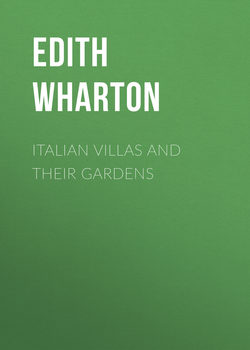Italian Villas and Their Gardens

Реклама. ООО «ЛитРес», ИНН: 7719571260.
Оглавление
Edith Wharton. Italian Villas and Their Gardens
INTRODUCTION. ITALIAN GARDEN-MAGIC
I. FLORENTINE VILLAS
II. SIENESE VILLAS
III. ROMAN VILLAS
IV. VILLAS NEAR ROME
I. CAPRAROLA AND LANTE
II. VILLA D’ESTE
III. FRASCATI
V. GENOESE VILLAS
VI. LOMBARD VILLAS
VII. VILLAS OF VENETIA
ARCHITECTS AND LANDSCAPE-GARDENERS MENTIONED
ALESSI (GALEAZZO) 1512-1572
ALGARDI (ALESSANDRO) 1602-1654
AMMANATI (BARTOLOMMEO) 1511-1592
BERNINI (GIOVANNI LORENZO) 1598-1680
BORROMINI (FRANCESCO) 1599-1667
BRAMANTE (DONATO) 1444-1514
BROWN (LANCELOT) 1715-1783
BUONTALENTI (BERNARDO TIMANTE) 1536-1608
CAMPORESI (PIETRO) B. –, d. 1781
CARLONE
CASTELLI (CARLO) XVII Century
CASTELLO (GIOVANNI BATTISTA)
CRIVELLI. XVII Century
FERRI (ANTONIO) XVII Century
FONTANA (CARLO) 1634-1714
FONTANA (GIOVANNI) 1546-1614
FRIGIMELICA (COUNT GIROLAMO) XVIII Century
JUVARA (FILIPPO) 1685-1735
LE NÔTRE (ANDRÉ) 1613-1700
LIGORIO (PIRRO) 1493-1580
LIPPI (ANNIBALE) B. –, d. 1581
LONGHENA (BALDASSARE) 1604-1682
LUNGHI OR LONGHI (MARTINO) THE ELDER. XVI Century
MARCHIONNE (CARLO) 1704-1780
MICHELANGELO (SIMONE BUONARROTI) 1475-1564
MONTORSOLI (FRA GIOVANNI ANGELO) 1507-1563
MOORE (JACOB) 1740-1793
MORA. XVII Century
NOLLI (ANTONIO) XVIII Century
NOLLI (PIETRO) XVIII Century
OLIVIERI (ORAZIO) OF TIVOLI. XVI Century
PALLADIO (ANDREA) 1508-1580
PARIGI (GIULIO) B. –, d. 1635
PERUZZI (BALDASSARE) 1481-1537
PIRANESI (GIOVANNI BATTISTA) 1720-1778
PONZIO (FLAMINIO) 1575-1620
PORTA (GIACOMO DELLA) 1541-1604
PRATI. XVIII Century
RAINALDI (GIROLAMO) 1570-1655
RAPHAEL SANZIO. 1483-1520
REPTON (HUMPHREY) 1752-1818
ROMANO (GIULIO DEI GIANNUZZI—ALSO CALLED GIULIO PIPPI) 1492-1546
RUGGIERI (ANTONIO MARIA) XVIII Century
SANGALLO (ANTONIO GIAMBERTI DA) 1455-1534
SANGALLO, THE YOUNGER (ANTONIO CORDIANI DA) 1483-1546
SANGALLO (GIULIANO GIAMBERTI DA) 1445-1516
SANSOVINO (JACOPO TATTI) 1487-1570
SAVINO (DOMENICO) XVIII Century
TITO (SANTI DI) OF FLORENCE. 1536-1603
IL TRIBOLO (NICCOLÓ PERICOLI) 1485-1550
UDINE (GIOVANNI DA) 1487-1564
VAGA (PIERIN DEL) 1500-1547
VASANZIO (GIOVANNI) B. –, d. 1622
VASARI (GIORGIO) 1511-1574
VIGNOLA (GIACOMO BAROZZI DA) 1507-1573
Отрывок из книги
For centuries Florence has been celebrated for her villa-clad hills. According to an old chronicler, the country houses were more splendid than those in the town, and stood so close-set among their olive-orchards and vineyards that the traveller “thought himself in Florence three leagues before reaching the city.”
Many of these houses still survive, strongly planted on their broad terraces, from the fifteenth-century farmhouse-villa, with its projecting eaves and square tower, to the many-windowed maison de plaisance in which the luxurious nobles of the seventeenth century spent the gambling and chocolate-drinking weeks of the vintage season. It is characteristic of Florentine thrift and conservatism that the greater number of these later and more pretentious villas are merely additions to the plain old buildings, while, even in the rare cases where the whole structure is new, the baroque exuberance which became fashionable in the seventeenth century is tempered by a restraint and severity peculiarly Tuscan.
.....
If, owing to circumstances, the more famous pleasure-grounds of Florence have lost much of their antique charm, she has happily preserved a garden of another sort which possesses to an unusual degree the flavour of the past. This is the villa of the Gamberaia at Settignano. Till its recent purchase, the Gamberaia had for many years been let out in lodgings for the summer, and it doubtless owes to this obscure fate the complete preservation of its garden-plan. Before the recent alterations made in its gardens, it was doubly interesting from its unchanged condition, and from the fact that, even in Italy, where small and irregular pieces of ground were so often utilized with marvellous skill, it was probably the most perfect example of the art of producing a great effect on a small scale.
The villa stands nobly on a ridge overlooking the village of Settignano and the wide-spread valley of the Arno. The house is small yet impressive. Though presumably built as late as 1610, it shows few concessions to the baroque style already prevalent in other parts of Italy, and is yet equally removed from the classic or Palladian manner which held its own so long in the Venetian country. The Gamberaia is distinctly Tuscan, and its projecting eaves, heavily coigned angles and windows set far apart on massive consoles, show its direct descent from the severe and sober school of sixteenth-century architects who produced such noble examples of the great Tuscan villa as I Collazzi and Fonte all’ Erta. Nevertheless, so well proportioned is its elevation that there is no sense of heaviness, and the solidity of the main building is relieved by a kind of flying arcade at each end, one of which connects the house with its chapel, while the other, by means of a spiral stairway in a pier of the arcade, leads from the first floor to what was once the old fish-pond and herb-garden. This garden, an oblong piece of ground, a few years ago had in its centre a round fish-pond, surrounded by symmetrical plots planted with roses and vegetables, and in general design had probably been little changed since the construction of the villa. It has now been remodelled on an elaborate plan, which has the disadvantage of being unrelated in style to its surroundings; but fortunately no other change has been made in the plan and planting of the grounds.
.....